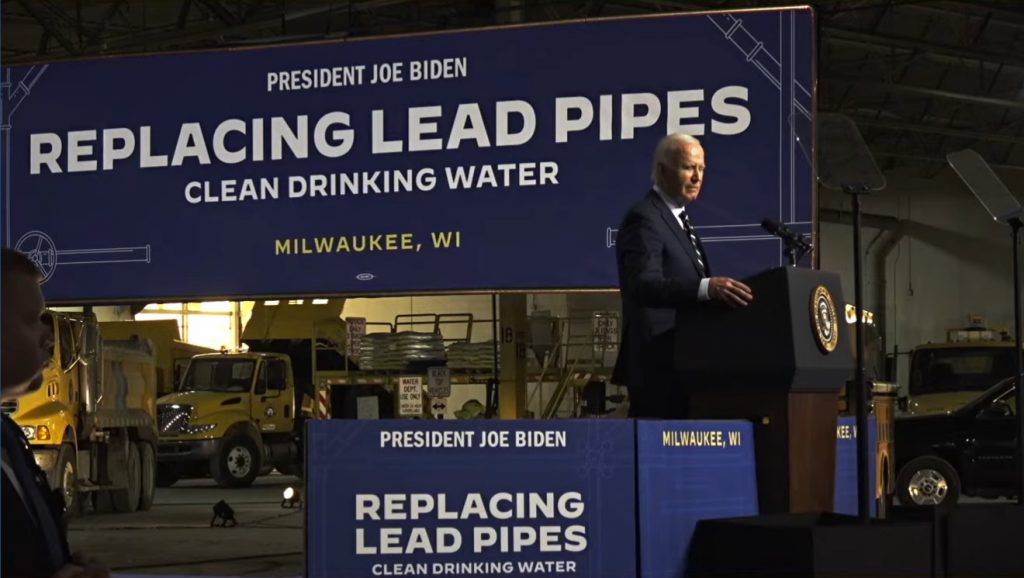Wisconsin Joins Legal Effort to Preserve Tougher Standards for Lead in Water
Joins 9 states and DC to back new federal rules and push to replace lead pipes.

Then-President Joe Biden visited Milwaukee in October 2024 to announced a new rule requiring the replacement of all lead water pipes in the U.S. by 2037. On Wednesday, Attorney General Josh Kaul announced Wisconsin is joining nine other states and D.C. to defend the rule. (Oct. 8, 2024 screenshot/White House livestream)
Wisconsin has joined with nine other states and the District of Columbia to defend the federal lead and copper water rule that took effect Dec. 30, tightening standards for lead exposure and requiring water systems across the county to replace lead pipes by 2037.
The new rule, which then-President Joe Biden announced in Milwaukee in October, has been challenged by the American Water Works Association, a trade group for water and wastewater utilities.
The Wisconsin Department of Justice announced Wednesday the state was joining the legal effort to intervene in the lawsuit in support of the rule. Other states in the coalition are California, New York, Connecticut, Illinois, Maryland, Massachusetts, Minnesota, New Jersey and North Carolina, along with D.C.
“Reducing lead in our drinking water shouldn’t be controversial,” Attorney General Josh Kaul said. “This common-sense rule that helps protect people’s health should remain in place.”
Lead exposure has been identified as a health hazard, especially for children, and has been linked to premature birth, damage during brain development and learning disabilities, delayed physical development in children and cardiovascular and kidney problems in adults. No amount of lead in drinking water is safe, according to the U.S. Environmental Protection Agency.
On Tuesday, Gov. Tony Evers approved an emergency rule from the Wisconsin Department of Health Services (DHS) to lower the threshold for lead poisoning to 3.5 micrograms per deciliter. The change makes more children and families eligible for intervention to diagnose and treat lead poisoning.
Evers has announced plans to seek a $6.2 million increase for local health departments, some of that to address lead poisoning, in the 2025-27 state budget that he will release in February.
Wisconsin joins legal effort to preserve tougher requirements for lead in water was originally published by Wisconsin Examiner.
More about the Lead Crisis
- Gov. Evers Signs New PFAS, Lead Regulations - Danielle Kaeding - Mar 2nd, 2026
- City Receives $400,000 Grant For Lead Screening - Sophie Bolich - Feb 24th, 2026
- Rep. Madison Proposes Restoring Local Control Over Lead Inspections - State Rep. Darrin Madison - Jan 6th, 2026
- $43 Million Later, MPS Says Classrooms Are Safe From Lead Dust - Corrinne Hess - Dec 18th, 2025
- MPS Buildings Cleared of Lead-Paint Risks after 10-Plus Months of Work - Milwaukee Public Schools - Dec 17th, 2025
- Wisconsin Moves to Require Lead Service Lines Replaced By 2037 - Danielle Kaeding - Dec 11th, 2025
- Gov. Evers, DNR Announce More Than $159 Million to Ensure Clean, Safe Drinking Water for Wisconsinites in 29 Municipalities - Gov. Tony Evers - Dec 10th, 2025
- EPA Announces $3 Billion in New Funding for States to Reduce Lead in Drinking Water - U.S. Environmental Protection Agency - Nov 25th, 2025
- Wisconsin Communities Get $282 Million for Drinking Water Projects - Danielle Kaeding - Nov 19th, 2025
- MKE County: County Launches Lead Abatement Program - Graham Kilmer - Nov 9th, 2025
Read more about Lead Crisis here





















